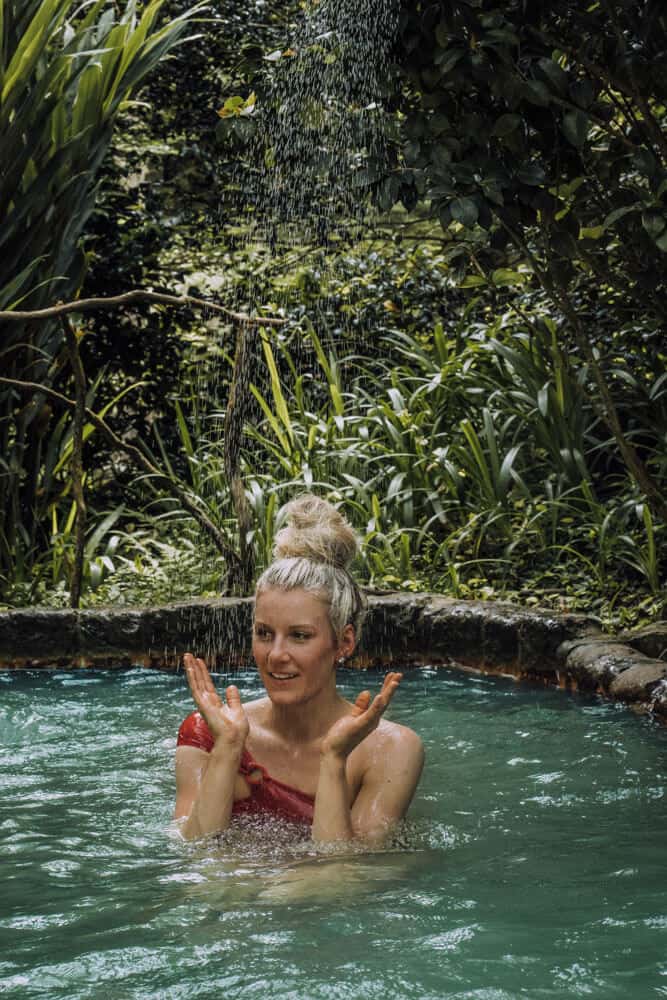
The Azores are a geothermal hotbed of natural springs and black sand beaches, as well as waterfalls, volcanoes and coastal hikes. I highly recommend a trip to the nine islands of the Azores. If you’re wondering what else makes this Portuguese archipelago so appealing, read our post on the top 10 things to do in Sao Miguel; you won’t be sorry!
Azores Weather: What You Need to Know
But while the islands’ phenomenal scenery – think Big Island Hawaii crossed with Iceland – is absolutely breath-taking, Azores holidays are largely dependent on the weather. Situated in the middle of the Atlantic, the Azores climate is known to be somewhat temperamental, to say the least, with clouds and rain threatening to obscure the great views on any given day.
The best time to visit the Azores is obviously when the weather is good, and that can be a bit of a gamble. Luckily, we’ve been there, so this post can help you plan effectively. Here’s what you can expect from your Azores holiday.
Read more things you should know about the Azores before visiting here.
Azores Islands Weather – It’s not One and the Same

You should know that the Azores weather changes rapidly and varies hugely on different parts of the islands. So you shouldn’t expect a clear and sunny beach destination all year round; it can be cold, gloomy and foggy – sometimes even in the middle of summer!
For example, it will often be cold and misty at the top of a mountain, but sunny down at the beach. I still don’t understand how this is possible, but it is! So if it’s very cloudy in one place, you may be able to drive to a different side of the island to escape it.
Quite often, if there is a lot of cloud cover at the place you want to visit, you can wait half an hour to see if it clears up. Patience, flexibility, and spontaneity are key here!
When is the Best Time to Visit the Azores?
In our opinion, the best time to visit the Azores is during the high season months of June, July, August, and September, when it is sunny and warm. However, this time of year is also the busiest and most expensive (though it still isn’t that bad in peak season).
Usually, we’d recommend going to a destination out of season to save money, but on this occasion, we do think it’s worth going in peak tourist season for the better weather. Otherwise, you may find that it’s too cold, rainy, or gloomy to get the views and photos you’ve been hoping for.
That said, you definitely need to be prepared for the changeable climate of the Azores at any time of year – look what happened to us at the best viewpoint on the island in June! (see pictures of a foggy Boca do Inferno lookout)
Azores Weather Webcams
Azores tourism officials realize that the weather has an important part to play in your Azores holiday, so they’ve installed a series of webcams – like the VisitAzores webcam and the SpotAzores app – at major tourist attractions around the islands where you can check out the current Azores climate and visibility before you head out.
For example, if you’re planning on visiting the viewpoint or hiking around Boca do Inferno, we recommend checking the webcam beforehand and aiming to go in the morning or later in the day, as it tends to get cloudier towards the middle of the day. We found this to be true when we were there.
The Azores Climate
There is not a huge variation in the climate in the Azores between the winter months and the summer months. Of course, the temperatures will change enough that going during the chilly months isn’t conducive to lying on a beach lounger, but it’s never actually going to snow.
The Azores climate is officially classified as ‘subtropical oceanic’ because of its proximity to the Atlantic Ocean; a fancy way of saying warm summers and cooler winters. On the whole, the climate is rather mild – even the hottest summer days very rarely reach over 80 degrees Fahrenheit (30 degrees Celsius), and even the coldest winter days are a mild 50 degrees Fahrenheit (10 degrees Celsius). So it’s safe to say that the Azores islands are never freezing cold.
While the dramatic cloudy climate and rainy weather can still be fantastic for photographs, there are certain things you only want to do in sunny weather, such as the island hikes with incredible views, or lounging on a black sand beach. Don’t let the weather ruin your trip by making sure you go at the right time of the year.
Average Rainfall in the Azores

The main reason for visiting Azores Portugal in the high season months (from July to September) is that it is a bit hotter and has the least amount of rainfall. The winter months get a lot more rain, which cools those temperatures down and makes hiking and relaxing on the beach more difficult.
To give you some perspective, it rains about 15 days a month on average in winter in the Azores, versus only eight days a month in summer. The result is that the islands are beautifully lush and green all year long!
Average Temperature in Ponta Delgada Azores

Take a look at the average temperatures in Ponta Delgada Azores during the high season:
Average Azores Weather May: 55 – 68⁰F (13 – 20⁰C)
The month of May is just before the high season starts, and the average May temperature in the Azores doesn’t quite reach 70 degrees. This cooler weather is perfect for hikes and hot springs, as well as whale watching, but if you feel like lounging on the beach, you might want to wait until July or August.
Average Azores Weather June: 59 – 72⁰F (15 – 22⁰C)
The weather in the Azores in June is a little hotter, and even better if you wait until later in the month. This is when we went and found it gorgeous for hiking and touring, but it was still a little bit too cool for lounging on the Azores beaches.
Average Azores Weather July: 63 – 75⁰F (17 – 24⁰C)
The Azores islands weather in July is ideal for enjoying the sunshine and lounging on the black sand beaches. Flights are going to be the most expensive, but they still won’t be terrible, because some of the routings are summer seasonal only.
Average Azores Weather August: 64 – 79⁰F (18 – 26⁰C)
August is another peak month in the Azores with the hottest beach weather. If you’re hiking, you might want to head out in the early morning for cooler weather, then spend the afternoon on the beach.
Average Azores Weather September: 64 – 77⁰F (18 – 25⁰C)
September is also peak tourist season in the Azores. The weather has not really cooled down yet, making it another excellent time to visit the islands. As with the weather in August, you can enjoy cooler mornings and hot afternoons – perfect for a late-summer beach holiday.
Average Winter Temperatures
The average winter temperatures in the Azores are a mild 60 degrees Fahrenheit on average during the day, dropping to about 50 degrees Fahrenheit at night, so it’s hard to say that any time of the year is freezing. The months from October to April do get a bit more wind than the summer months though.
Don’t let the cooler weather deter you, as there are some gorgeous days even in the off-season, and the winter days that are sunny are divine! If you’re planning an off-season trip, here’s what you can expect:
- October: 61 – 72⁰F (16 – 22⁰)
- November: 57 – 68⁰F (14 – 20⁰C)
- December: (55 – 64⁰F (13 – 18⁰C)
- January: (54 – 63⁰F (12 – 17⁰C)
- February: (52 – 63⁰F (11 – 17⁰C)
- March: (54 – 63⁰F (12 – 17⁰C)
- April: 54 – 64⁰F (12 – 18⁰C)
The climate in the Azores can seriously affect your trip, which is why it’s best to pick the right time of year for the activities and attractions you want to enjoy. But no matter what time you visit the Azores, the beauty of these enchanting islands is undeniable. Have fun!

